- Home
- Joan Lowery Nixon
A Family Apart Page 13
A Family Apart Read online
Page 13
Step by step, Frances walked to the back of the barn. Someone had to be here. But where?
She climbed the ladder high enough so that she could see across the hayloft. No one was there. Slowly she climbed down, facing the back of the barn.
Frances looked around again. The loft extended at least four feet beyond the first floor of the barn, but the outside walls of the barn were straight and unbroken. Then the realization hit her. There had to be a hidden room beyond Daisy’s stall. Jake had made it clear that the Underground Railroad shouldn’t concern her, but she couldn’t stop herself.
She ran her fingers up and down the boards, which were firm until the pressure of her hands caused one to give a little. Frances pushed again, but the board held fast, as though someone were pressing even harder on the other side. There was a knothole in the second board, and Frances stretched on tiptoe to look through it. She wasn’t totally surprised to discover an eye looking back at her!
She stumbled back, letting out a yelp, as a hidden door in the wall swung inward. A black man stumbled out, and behind him stood a small, thin woman, whose shawl was wrapped closely around her back and shoulders.
“I know you’re the slaves the bounty hunters are looking for,” Frances whispered. “Don’t be afraid of me! I want to help you!”
The man’s broad shoulders seemed to droop with exhaustion. “We’re trying to make our way north to Canada, and we were told we could find help at this place. Your pa said we could bed down here.”
“This place is safe,” she assured them. But the woman continued to look so frightened that Frances tried to put her at ease. “My name is Frankie,” she said. “Who are you?”
The woman gave a little whimper and tugged at the man’s sleeve. He shook his head. “We better hide again. Someone else might come.”
“We’d hear the horses in plenty of time,” Frances said. “Please talk to me.”
They looked at each other a moment, then the man nodded. “I’m Janus. My wife is called Odette.”
“Do you have any children?”
Odette nodded. “Our master took our son away from us when he was five years old and gave him as a wedding gift to his daughter, who was moving to a city far away.” Her voice was dry, as though she had run out of tears to soften it.
“He gave away your son!” Frances was horrified.
“We begged, but it did no good,” Odette said. “We knew we weren’t never going to see our boy again. We wanted to take him and run, but he was gone before we knew about the Underground Railroad. Then four weeks ago, when we found out that Janus was going to be sold, we ran away.”
“It’s not fair!” Frances clenched her fists, furious at the man who had caused all their trouble. “Families shouldn’t be torn apart!” She stopped abruptly as the picture of her own family flashed across her mind.
“I’ve brought some food.” Jake’s voice, behind Frances, startled her, and she whirled around. He stood just inside the door, holding a pot that smelled like Margaret’s thick meat soup and a cloth-wrapped bundle that probably contained a loaf of bread. “This is my son Frankie,” Jake told the couple. “He shouldn’t have come out here, but we can trust him not to reveal anything.” The glance that he turned on Frances was serious. “You told me that you wanted to help.”
“I do,” Frances said.
“Then get back to the house and take some soup to Margaret and Peter.”
Without a word Frances turned and ran to the kitchen. By the time Jake returned, she had taken care of the invalids. She’d fed them and then, following Margaret’s directions, she’d dipped strips of flannel in a mixture of gum camphor and goose oil and wrapped the cloths around Margaret’s and Petey’s throats to help stop their coughing. Megan would have been much better at it, Frances thought. All of Megan’s shyness and unsureness disappeared when she comforted and nursed the younger children.
Frances fed Barker and quickly set places at the table for Jake and herself. Jake ate without speaking until his soup bowl was empty. Frances, afraid he was angry because she had gone to the barn, ate in silence as well. Finally Jake raised his head and asked, “Can you cook?”
“A little,” Frances said, thinking of the limited foods her family had eaten. “I can make porridge.”
“Fine. In the morning make plenty, and cook it thick so it will be filling. Is there enough bread?”
“Two more loaves, that’s all. But, I don’t know how to bake bread.”
Jake nodded. “I wouldn’t expect a boy to. We’ll make do.” For the first time since they had met in the barn, he smiled at Frances.
He hadn’t spoken yet about Odette and Janus, and Frances couldn’t stand it any longer. “How long will they be here?” she blurted out.
Jake lowered his voice. “Until the time is right. Until we hear that the bounty hunters have moved on.”
Frances wanted so much to help Odette and Janus. “I’d like to bring them the extra quilt on my bed,” she told Jake.
“They have quilts enough,” Jake said. “They’re not the first to stay here in cold weather.” He smiled. “But there will be plenty that you can do for them. I’ll let you know when I need you.”
“Oh, yes!” Frances said. “I’ll do anything.”
Jake leaned toward her. “Frankie, it would be dangerous for all of us if anyone learned about our part in the Underground Railroad. It’s important that you not let on to anyone that you know that Janus and Odette are here. And you must never give away the hiding place.”
“I promise!” Frances said. “No one will ever learn the secret from me!”
For the next two days, Frances not only tended to the household chores and to Margaret and Petey, but at times carried meals to Janus and Odette. She’d stay to talk with them, and they began to relax and talk to her.
“When will they go?” she asked Jake.
“As soon as it’s safe, someone will let me know.”
Frances was delighted when Petey grew too energetic to keep in bed and when Margaret, still a little weak, rose even before Frances to bake bread. The brick oven warmed the kitchen, and the sweet, yeasty fragrance of the rising loaves filled the room.
That morning Frances carried in the pails of milk alone because Jake had picked up a cough so strong that it shook his body. She found Margaret sitting in the wide Boston rocker, snuggling Petey in her lap. Frances, so tired of pretending to be a boy, yearned to be able to curl up on Margaret’s lap, too.
Petey beamed at Frances. “Mama sang me three songs! And she’s going to teach me one about a pony to ride.”
Mama? Frances took a sudden breath. The word was a blow that stunned and confused her. This was what she had wanted, wasn’t it? For Petey to have someone to love him and snuggle him and care for him, in place of the mother who heartlessly sent him away?
Margaret reached for Frances’s hand. “Thank you for your wonderful care,” she said. “There is so much tenderness in you, Frankie. You cared for us as well as any woman could.”
Now is the time to tell the truth, Frances thought. I can’t stand to go on pretending to be a boy much longer. Petey is happy and he has another mother to love him, even if they send me away. “There’s something I must explain to you,” she began to tell Margaret.
At that moment Jake stumbled into the house, banging the door behind him. His face was flushed, and he dropped into the nearest chair, shaking and coughing.
Margaret put Petey down and jumped up. “You have the fever, Jake. Come. You need to rest in bed.”
Jake shook his head. “The signs are that the weather will close in soon. I must take Janus and Odette to Klaus Mueller’s today.”
“You can’t,” Margaret said stubbornly. “You’re in no condition to go!”
“They can’t stay here. Once the winter storms come, they won’t be able to make it to Canada.”
“We’ll—we’ll find someone else who can take them. Maybe Carl Busby.”
“Carl is not a part of the
railroad.”
“But in this case—”
“We can’t take the chance.”
Frances was terrified, but Jake needed the help she had promised, and so did Odette and Janus. She had no other choice. She tried to sound brave and determined. “Let me go,” she said. “I can do it.”
“It’s too much for you to handle,” Jake said. “There’s a full load of corn fodder to take, too.”
Frances was insistent. “Janus can help me load the sacks on the wagon inside the barn. You know I can take care of the rest. And I can keep the secret.”
Margaret looked at Frances, then at her husband. “It’s only half a day’s drive to the Muellers’ farm. If Frankie follows the road north, he can’t get lost.” She turned to Frances. “All you have to do is follow the road. It will take you over the border into Nebraska Territory. The river will be low enough to ford easily. The Muellers’ farm will be the first one you come to.”
Jake tried to speak, but he shook with another spasm of coughing.
Margaret was firm. “Let him do it, Jake. You’re so ill that the drive could kill you! I’m sure those bounty hunters must have left this area days ago.”
Before Jake could answer, Margaret began to pack food for Frances, Janus, and Odette. Frances bundled up and hurried to the barn.
“It’s time to leave,” she told Janus and Odette, hoping they weren’t able to see the way her hands trembled. “We’ll make a hiding place for you among the sacks. No one will suspect that you’re traveling in broad daylight.”
“Where’s your pa?” Janus stared at her with concern.
“He’s too ill to go,” she said. “I’m going to take you.”
“You’re just a child.”
Frances shook her head. “That’s all to the good, I’m thinking. Who would suspect a—a boy? I’ll need you to help me load the sacks. We’ll have to hurry.”
They worked together quickly, loading the sacks, leaving a trench down the middle where Janus and Odette could lie. They harnessed the horses and laid a canvas sheet over the wagon. When Frances was satisfied that Janus and Odette were as comfortable as possible, she tied down the canvas at the wagon’s four corners.
Margaret brought the food to the wagon—two parcels, one for Frances, one for Janus and Odette. “Be very, very careful.” Margaret hugged Frances tightly. “Stay on the road,” she added, “and watch for any sudden changes in the weather.”
Frances smiled. “I’ll get them there all right.” She hugged Margaret tightly. She realized how much she cared for Margaret and Jake, who were becoming like family to her. They were good people and kind, and she wouldn’t let them down.
She hopped up on the seat, clucked to the horses, and drove the wagon onto the road, heading north.
Frances saw no one else on the road. It was a gray day, with a buildup of clouds to the north, and the wind stung her face. At first Frances was nervous and glanced often from side to side, but as the miles went by she began to relax. She wished Mike and Danny were with her. Wouldn’t she love to show Mike how well she could handle a team of horses! He’d probably never let on he was proud of her, but he would be, and Danny would beg to be allowed to handle the reins.
She ate the bread and meat that Margaret had prepared for her and looked out across the low rolling hills, where the grasses shivered in waves and ripples. To the east she caught glimpses now and then of a narrow band of silvery water that twisted through the stands of cottonwoods, aspens, and maples. The river began to curve to the west, and Frances knew she was getting close to the place where they could ford it.
With one gloved hand Frances rubbed the back of her neck, arching her shoulders and stretching. Jake and Margaret had no reason to be concerned for her. She had brought the wagon almost to Nebraska, and nothing had happened.
Suddenly, from behind them, came shouts and hoofbeats. Frances knew she had relaxed too soon. Terrified, she looked over her shoulder and saw the marshal and the two bounty hunters racing toward her.
13
FRANCES PULLED THE horses to a halt, cringing as one bounty hunter stopped so close to her that she could see the red veins in his windburned eyes.
“Jake’s new boy. Frankie, isn’t it?” Marshal Dawson asked, then, giving her no time to answer, he added, “Where are you off to?”
“I—I’m taking a load of corn to Mr. Mueller’s farm,” she stammered, “because Jake can’t do it. He’s ill with the fever.” She tried not to meet his eyes and prayed that the secret she carried didn’t show on her face.
“Sorry to hear that Jake’s ailing,” the marshal said.
One of the bounty hunters interrupted him. “Since the boy’s goin’ into Nebraska, he may have more than corn in that load.”
“That could be so,” the other bounty hunter said. He leaned close to peer into her face. Frances shot him a look of hatred and anger and quickly turned away. She tried to keep her hands from shaking by gripping the reins tightly and pressing them against her knees.
Frances’s stomach clutched, and she held her breath as one of the bounty hunters slowly rode to the back of the wagon to poke at the canvas and the sacks of corn with the barrel end of his rifle.
“You seen any sign of those runaways?” the other bounty hunter asked. “Remember—a man and a woman. And she’s got an embroidered shawl. Stole it from her mistress.”
Frances remembered how Mike had taught her to face the street bullies in New York. These men seemed no different, so a show of spunk would be her best defense. She knew they were watching her closely for any sign of fear, which would let them know their suspicions had been right, so with all her might she fought her terror, stared scornfully, and retorted, “Stole it? That’s not the truth. The marshal said that the woman gave it to her.”
“You got a good memory,” he said. “So remember this. Anyone who helps slaves escape can get sent to prison.”
“He’s just a boy doin’ a job for his pa,” the marshal said. “Let him get on his way. It’s going to snow soon.”
The men guided their horses back a few steps, then whirled and rode in the direction from which they had come.
Frances’s hands shook inside her heavy gloves, and it was hard to hold the reins, but just in case they had glanced back to watch her, she sat straight as a new board and clucked to the horses to start up again.
It wasn’t until they were out of sight that Frances finally was able to breathe normally. The wagon rolled on. At last the narrow river crossed their path ahead, and she soothed the horses down the bank and into the shallow water. She could easily see farm buildings on the other side. The Muellers’ farm. She was weak with relief when she finally drove into the yard and up to the barn.
Mr. Mueller ran out to meet her, grasping the horses’ bridles and leading them into the barn. “You get into the house,” he said. “I’ll take care of everything.”
As Frances entered the warm kitchen, Johnny grinned at her.
“My pa never let me drive the wagon alone,” he said.
Frances clutched Mrs. Mueller’s arm with fingers still stiff from the cold and whispered, “The bounty hunters stopped me. They’re still looking for a woman wearing that embroidered shawl. This time they said she stole it. Odette mustn’t wear it any longer. She can take my coat.”
“You need your own coat,” Mrs. Mueller said in hushed tones. “We have extras, and we’ll give one to her.” Her voice returned to normal. “Now, Frankie, don’t waste time with worry. Use your energies to eat.” She propelled Frances to the table and put a plate of hot potatoes, carrots, and boiled beef in front of her.
While his brothers concentrated on their meals, Johnny leaned across the table and whispered, “Tell me about the slaves. How many were there?”
“Two,” Frances mumbled, her mouth full.
“Let Frankie eat his food in peace,” Mrs. Mueller said, frowning at Johnny as she tossed quick glances at his younger brothers. “This is not the time for talk.”
Later, after the younger three boys had been sent to bed, Johnny told Frances, “You brought them by yourself. You’re really brave!”
“I wasn’t brave. I was frightened,” Frances confided.
He shook his head. “That doesn’t matter. You were brave enough to take a big chance and break the law! If you were caught, you’d go to prison!”
“Johnny!” Mrs. Mueller warned.
“I didn’t want to break the law,” Frances said, “and it didn’t seem wrong to help those people.”
“It wasn’t wrong,” Mrs. Mueller said.
Frances slowly shook her head. “It’s such a muddle. The people who obey the laws, like those bounty hunters, are really doing the wrong thing; and the people who try to help the slaves reach freedom are right, but they’re breaking the laws!”
Mr. Mueller had slipped into the kitchen in time to hear most of the discussion. He nodded from his seat by the fire. “In this case, at least, you did not do a bad thing, Frankie. The people who help slaves to find freedom have chosen to take the risk of going to prison, to make a sacrifice to help someone else.”
“Sacrifice,” Frances said, repeating the word she had heard her mother use. She sighed. “I’ve heard adults talk of sacrifice, but I don’t really understand all that it means.”
Mrs. Mueller pulled off her apron and hung it on a hook on the side of a cupboard. “Sacrifice is not always easy to understand, Frankie. It means that someone or something else means more to you than your own self. Let me explain it this way—it means that you can love someone or some idea enough to give up something that you prize, in order to make people’s lives better. You understand that, Frankie. Today, to help others, you made a sacrifice.”
She patted Frances’s shoulder. “Enough talk,” she said. “It’s time for this boy to get his rest.” She led Frances to a bed in the room with the little boys, who were bundled into quilts on the floor. “Sleep,” she said. “You’re so tired that your eyes will close the moment you pull the quilt around your ears. We want you to have a good night’s rest, because if the weather is clear tomorrow you will have that long ride back.”

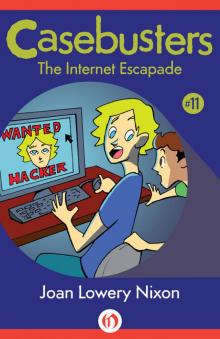 The Internet Escapade
The Internet Escapade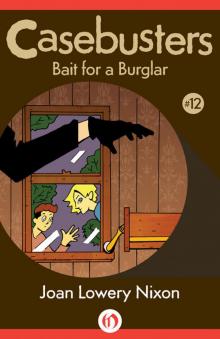 Bait for a Burglar
Bait for a Burglar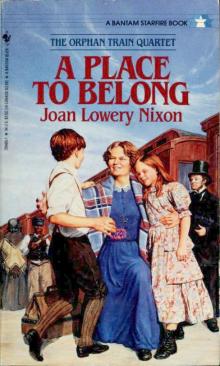 A Place to Belong
A Place to Belong Nightmare
Nightmare Sabotage on the Set
Sabotage on the Set The Other Side of Dark
The Other Side of Dark Whispers from the Dead
Whispers from the Dead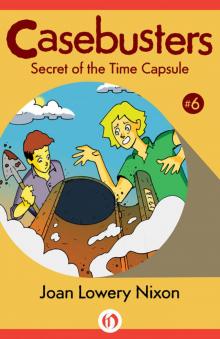 Secret of the Time Capsule
Secret of the Time Capsule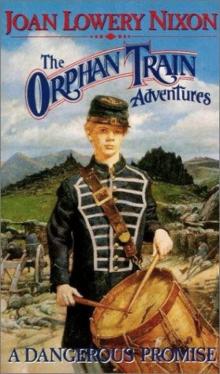 A Dangerous Promise
A Dangerous Promise Laugh Till You Cry
Laugh Till You Cry Spirit Seeker
Spirit Seeker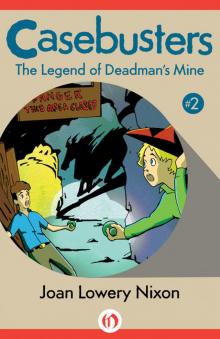 The Legend of Deadman's Mine
The Legend of Deadman's Mine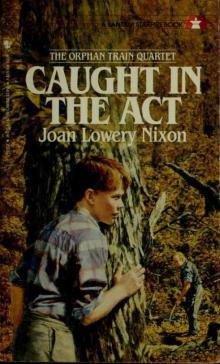 Caught in the Act
Caught in the Act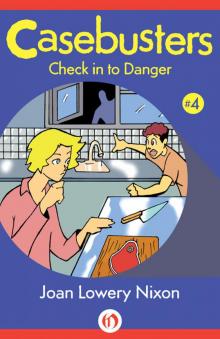 Check in to Danger
Check in to Danger Ellis Island: Three Novels
Ellis Island: Three Novels The Name of the Game Was Murder
The Name of the Game Was Murder The Haunting
The Haunting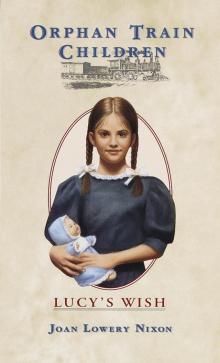 Lucy’s Wish
Lucy’s Wish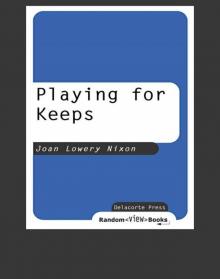 Playing for Keeps
Playing for Keeps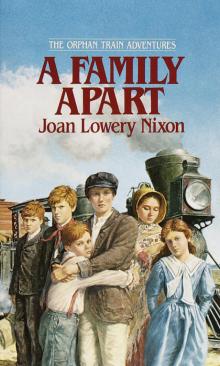 A Family Apart
A Family Apart Nobody's There
Nobody's There Shadowmaker
Shadowmaker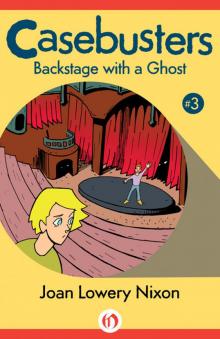 Backstage with a Ghost
Backstage with a Ghost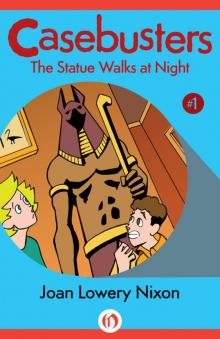 The Statue Walks at Night
The Statue Walks at Night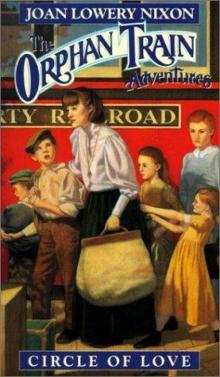 Circle of Love
Circle of Love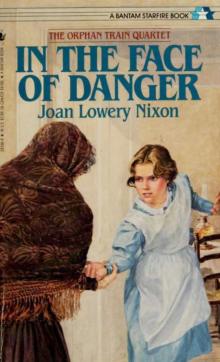 In the Face of Danger
In the Face of Danger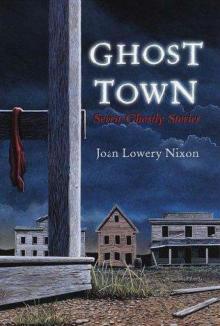 Ghost Town
Ghost Town A Candidate for Murder
A Candidate for Murder The Weekend Was Murder
The Weekend Was Murder The Island of Dangerous Dreams
The Island of Dangerous Dreams The Ghosts of Now
The Ghosts of Now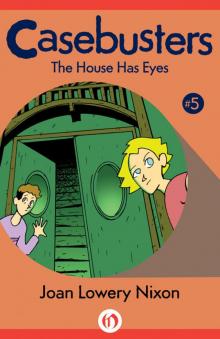 The House Has Eyes
The House Has Eyes The Dark and Deadly Pool
The Dark and Deadly Pool Keeping Secrets
Keeping Secrets Secret, Silent Screams
Secret, Silent Screams Beware the Pirate Ghost
Beware the Pirate Ghost Search for the Shadowman
Search for the Shadowman Haunted Island
Haunted Island